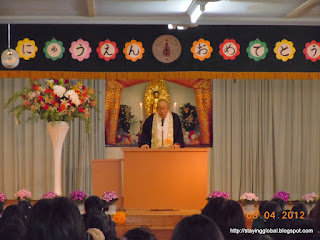Come April and lot of changes take place in Japan. Almost
anything new and important begins on or after 1st April. The arrival
of spring also marks the beginning of the new fiscal year and also the
beginning of a new school year.
Back in my country, the beginning of the school year is not
marked by any ceremony. In Japan, however the new school year is marked with a
special “Entrance” ceremony. Personally I liked this concept as students look
forward to the beginning of the new academic year and it is always good to make
the first day enjoyable, especially for new students who would otherwise be
slightly nervous on their first day in a new setting.
Entrance ceremonies are usually held across Japan in early
April. These ceremonies are held in all schools- right from Kindergartens to
High School. In kindergartens, these ceremonies are called “Nyuuenshiki” while
in Elementary to High schools these are called “Nyuugakushiki”.
Typically these ceremonies are held in the school gym and are
attended by the students and their families. The children dress in their school
uniforms while parents dress formally. Few parents also dress up in their
colourful kimonos. Some times grandparents also participate in the Entrance ceremony.In a typical ceremony, the old students and the parents are
seated in the gym and the new students march in to a round of applause,
welcoming them. The principal of the school then addresses the gathering, with
encouraging words for the students. Then the homeroom teachers are introduced.
Then PTA members or other teachers/ student representatives may also make short
speeches. The ceremony ends with the students singing the school song. After
this the students are led to their new classrooms by their teachers who then
brief the students about the various activities lined up in year ahead. Commemorative
class pictures are then taken which marks the end of the first day of the
school.
This week, we too attended an “Nyuuenshiki”- entrance ceremony
at our daughter’s kindergarten. Her school is managed by a Buddhist temple and
the entrance ceremony here includes certain Buddhist rituals.
The school gym podium
had a Buddhist altar in the centre.
At one end was a wooden Elephant with a
small Buddha statue on it.
At the
entrance to the gym, scrolls carrying names of each the students in calligraphy
were put up.
The ceremony began with the principal and three children dressed
in traditional attire walked up the podium, bowed before the altar, placed flowers and lit candles.
This was followed by everyone bowing in prayer. Then the principal made
a speech welcoming the students to a new year. Then a Buddhist priest addressed
the gathering and said encouraging words to the children.
This was followed by
all the children singing the school song. The Japanese course students sang in
Japanese while the International course students sang in English. After this
the homeroom teachers and the English teachers were introduced.
The school bus
drivers were also introduced. Then two priests walked up the podium for the
blessing ritual. The children walked up to the podium and each one was blessed
with sprinkling of holy water.
Then a PTA member addressed the gathering. After
this the ceremony concluded and the children were led to their classrooms by
their teachers, followed by their parents. The children played in their
playrooms, while the teachers briefed the parents about the year ahead. Activity
calendar for the year, important announcements and the bus schedules were
handed out. After this we all walked back to the gym where commemorative group
picture of the students,teachers and parents were clicked. After this we all
went home, the children bidding goodbye to their friends, enthusiastic about
going back to school the next day.







I’m very happy to read this. This is the kind of info that needs to be given and not the accidental misinformation that is at the other blogs. Appreciate your sharing this best doc.
ReplyDeleteThank you for the words of appreciation .
ReplyDeleteThats so hilarious can't stop laughing love it 10/10
ReplyDelete